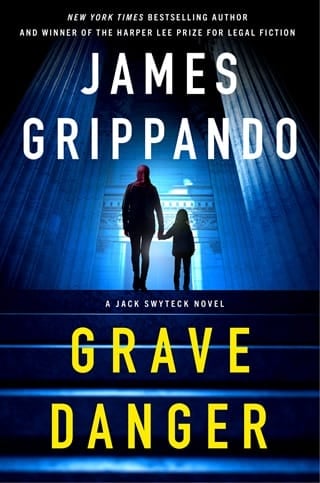Chapter 32
A classic rock radio station was playing in the elevator as Andie rode to the fourth floor of the Miami Field Office on Tuesday
morning. The receptionist flagged her the moment the chrome doors parted. Andie was slammed with work, and the last thing
she needed was an unscheduled visitor, but as the elevator music had just reminded her, you can’t always get what you want,
and when Murphy’s law collides with the wisdom of the Rolling Stones, you just might find, you get more than you need.
“Agent Henning, there’s a Mr. Farid Bazzi here to see you.”
Andie stopped. She had yet to take her morning coffee, so the message didn’t quite compute.
“Seriously? The Farid Bazzi from my husband’s case?”
“Unless you know another one. He’s waiting in the lobby.”
Andie stepped around the front desk and glanced through the bulletproof glass that separated the employee entrance from the
visitors’ lobby. Only one person was waiting, and he looked like the Farid Bazzi she’d seen on the news.
“Would you like me to tell him you’re not available?” the receptionist asked.
Andie had faced danger of every stripe in her career, but the sage advice of an instructor from her training at the Academy
in Quantico came to mind: “There’s no situation more dangerous than a domestic dispute.”
“He’s been through the metal detector, right?” asked Andie.
“Yes, of course.”
“It’s fine. I’ll see him. This should be interesting.”
The receptionist buzzed her through the locked security door, and Andie entered the lobby. Farid rose and politely introduced
himself.
“How can I help you, Mr. Bazzi?”
“I would like to speak with you,” he said. “It’s about my daughter, Yasmin.”
Andie could see in his eyes that he probably hadn’t slept all night.
“You do understand that my husband is Jack Swyteck, Zahra’s lawyer?”
“Yes, of course. That’s half the reason I’m here.”
“And the other half?”
“The fact that you’re an FBI agent. A mother. And I presume a very intelligent woman. Can we go somewhere and talk, please?”
So far, not so threatening. “Here is fine,” she said.
Farid returned to his seat. Andie took the chair across from him, near an engraved bronze plaque honoring the two Miami field
agents killed in a 1986 shootout that left five other agents wounded. They were alone in the lobby, save for the indistinct
murmuring of a Weather Channel reporter on the flat-screen television in the corner.
“I know you are busy, Agent Henning. So pardon my directness. Your husband seems convinced that Ava is dead. Do you believe
she is dead?”
“My, we are being direct. That’s not for me to say, Mr. Bazzi.”
“The Iranian government says Ava fled the country and is still alive. The US State Department has never contradicted that
statement.”
“I can’t speak for the State Department,” she said.
Farid paused, then looked Andie in the eye. “I didn’t kill my wife.”
“I didn’t say you did.”
“Everyone thinks it.”
“Not everyone,” said Andie. “Some people think you tried to kill her, or that you abused her so badly that she fled the country
and went into hiding.”
“What do you believe?” he asked.
Andie couldn’t tell him about the confidential dossier, which contained the visa application with Ava’s fingerprints on it—the
State Department’s “proof” that Ava was still alive. “It doesn’t matter what I think, Mr. Bazzi.”
“It does matter,” he said, his voice taking on urgency. Then he took a breath, as if to slow himself down, maybe even take
a step back. “Agent Henning, you have a daughter. She’s a little older than Yasmin, no?”
“I do.”
“Imagine that you are married to an abuser. Would you ever run away and leave your daughter behind to live alone with a monster? What mother would do that to her daughter, no matter
how much she feared for herself?”
Andie didn’t want to judge any woman in that situation, but she understood Farid’s point. Fleeing an abuser and leaving your
own daughter behind was almost unimaginable.
“I understand what you’re saying, Mr. Bazzi. But I don’t see where your hypothetical leads us.”
He leveled his gaze, again looking Andie straight in the eye. “I know why Ava ran away,” he said in a very serious voice.
Andie was beginning to wonder if she needed a witness to this conversation, but Farid had come to see her , and she didn’t want to shut down the flow of information. “Go on, please,” she said.
“Before she was arrested, Ava was part of a... how should I call it? Not an organization. A group of women.”
“Women in Tehran?”
“From all over Iran. Women who wanted change and who specifically opposed enforcement of the hijab laws.”
“Women who participated in the street demonstrations, you mean?”
“No. To the contrary. Most of them did not show their faces. They were too afraid. Or they had children and there was too
much to lose.”
“Then how did this group operate?”
“Mahsa Amini’s death changed everything in Iran. You know of Mahsa?”
“Yes. The young woman killed by morality police for disrespecting the Islamic Republic’s dress code.”
“The police said she was being ‘educated’ on hijab rules and suffered a heart attack—happens all the time to twenty-two-year-old
women in Iran. But yes, after Mahsa’s death, the demonstrations exploded. The government shut down the internet so that protesters
couldn’t organize. Information was hard to come by. This group of women—Ava included—became a network of information.”
“A network?”
“They shared text messages on their cell phones. ‘Street protests in Rasht.’ ‘Nine-year-old boy shot and killed in Izeh.’
‘Dress code crackdown at Anushiravan Dadgar High School in Tehran.’ The idea was to keep the information flowing. A woman
sees something, and she texts her friends, who text their friends, and it goes on and on.”
“I imagine it would be very dangerous if those messages were detected,” said Andie.
“Yes. Definitely. That was the reason for ‘the rule.’”
The rule. It made her think of Jack and the nonsensical rule that had caused so many problems in their marriage, but she killed that
thought. “What was ‘the rule’?”
“Pass on the message to another woman in the network and then immediately delete both the incoming and outgoing text message.
That way there would be no record of the substance of the communication if the morality police confiscated a woman’s cell
phone.”
“Brilliant,” said Andie. “Not even the tech geniuses at the FBI can retrieve the substance of deleted text messages. We can
only confirm the sender, recipient, and time of transmission.”
“Ah, but you are assuming the rule was followed.”
“Ava broke the rule?”
“Partly. She deleted the messages from her phone, but she saved them to a flash drive.”
“She told you this?”
“No. I found the flash drive in our home computer at our apartment. She left it there by accident. I knew nothing about the
network until then.”
Andie showed no reaction, but she’d read about Yasmin’s testimony about the scissors. She was certain that Farid’s version
of “what happened next” would be very different.
“Did you ask her about it?”
“Yes, of course.”
“What did she tell you?”
“She cried at first. It was such an emotional release for her to unload her secret.”
“What secret?”
“Ava was different from the other women. What I mean by that is that she played a different role in the information network.
A special role.”
“Meaning?”
“Ava didn’t just pass along information to other women in Iran. She was on the front line of gathering information about what
was happening in Iran and getting it to the outside world.”
Andie hesitated. Farid’s story was going in a direction she hadn’t anticipated. “Tell me how that worked.”
“She was saving all the text messages to a thumb drive and passing it along to her contact in Tehran. Her contact than passed
it along to whatever channels were available.”
“Who was her contact?”
“I have no idea. I’m not sure even Ava knew. She told me she did blind drops. Never met her contact. Could have been a Western
journalist. Maybe Amnesty International or some other human rights organization.”
Andie’s imagination led to other possibilities, especially on the heels of a visit from the CIA.
“I should have told her to stop what she was doing,” said Farid. “It was too dangerous. But I didn’t. I was actually...
proud of her.”
Andie studied his expression closely. She wasn’t sure if Farid was being truthful or deserving of an Academy Award.
“You said you knew why Ava fled the country.”
“Well, I don’t know . I have my own idea.”
“Tell me.”
“When Ava was arrested, the morality police took her to Evin Prison.”
“I’ve heard of it,” said Andie.
Evin was for political prisoners. It held so many students and intellectuals that an entire wing was nicknamed “Evin University.”
Reports of human rights violations in Evin were legion.
“Evin is notorious for its methods of interrogation,” said Farid. “They would have beaten every bit of information out of Ava if she had not escaped. The names of every woman in her text-messaging network. Hundreds of them. They all would have been arrested—or worse.”
“So, you believe Ava fled to—”
“To protect those women.”
“That’s your theory?”
“It’s more than a theory. Can you imagine how difficult that must have been for Ava? She left her daughter behind. But she
left knowing that Yasmin would be safe with me.”
“So, naturally, you divorced her and married her sister,” she said with a healthy dose of skepticism. “I’m not buying it,
Farid.”
“I was given no choice,” he said, a hint of desperation in his voice. “Divorcing Ava fit with the government’s story that
Ava was an unholy woman who abandoned Yasmin and me.”
“The regime forced you to divorce Ava. Is that what you’re saying?”
“Yes, exactly. After your wife is hauled off to Evin and you are left to raise a daughter on your own, it is the regime that
holds all the cards.”
“But the regime didn’t force you to marry Zahra.”
“That’s true.”
“Then why did you?”
He was about to answer, it seemed, but he stopped himself.
“There is a simple answer,” Farid said. “But so far, the information has flowed only one way in this conversation. I’ve opened
myself up, and you won’t even tell me if you think Ava is alive or dead.”
“Like I told you: what I think doesn’t matter.”
“It matters to me ,” said Farid.
“Why?”
“Until I heard the evidence in court, I was certain that Ava was still alive.”
He was plainly tired of her taking without giving, but Andie had to ask the obvious follow-up question—gently. “You’re not
so certain anymore?”
“Your husband’s cross-examination of Imam Reza made me wonder. It may seem like a technicality to a non-Muslim, but Mr. Swyteck was right. The imam would never have married me to Zahra so soon unless he believed Ava was dead.”
“Still, that’s not direct and incontrovertible proof of her death.”
“That’s why I’ve come to you. Your husband seems so certain that Ava is dead. Is he getting that information from you?”
“From me?”
“Does the US government know something I should know? Do they know Ava is dead?”
Andie couldn’t answer that question. The State Department dossier with Ava’s fingerprints on a visa application was classified.
“I can’t speak to you on behalf of the entire United States government.”
“I’m not asking you to be a spokesperson. I want to know how your husband has gotten the idea so firmly in his head that my
wife is dead.”
Andie noted that he still referred to Ava as “my wife,” but she still hadn’t decided if it was about love or ownership.
“I’m sorry,” she said. “I can’t help you. Your lawyer will have to speak to Jack about that.”
“I was hoping to get around the lawyers,” he said, rising. “But so be it.”
Andie rose too. “Thank you for coming, Mr. Bazzi.”
“You don’t believe a word I said, do you?”
Andie chose not to say. “Again, thank you for coming.”
Farid headed for the exit, opened the door, and then stopped.
“Persian women have the most beautiful hair,” he said. “In our culture, hair is one of the most recurring metaphors in poetry.
It’s almost spiritual, the essence of a person’s soul. Ava had such beautiful hair. She sacrificed that beauty to keep her
dignity. I don’t judge her for making that choice.”
Andie didn’t respond, but their gaze held for a moment. It wasn’t that Andie didn’t believe he was speaking the truth. She
just wasn’t proud—let alone prepared to admit —that in her world, there could be more than one “truth.”
Farid stepped out, and the door closed with a click of the electronic lock.
 Fullepub
Fullepub 



